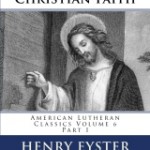On Sunday Pr. Matt Richard posted an excerpt from Dr. David Scaer’s book Law and Gospel and the Means of Grace (Confessional Lutheran Dogmatics: Volume VIII). As I was reading, I noticed that the transitions between sentences and even paragraphs were a bit strange. I then realized that several chunks of text had been removed and marked with ellipses. No problem—we all do that.
However, upon further examination, I noticed that Pr. Richard had not just removed a few extraneous subordinate clauses here and there, but huge portions of text. In light of the full context of Dr. Scaer’s words (provided below), I think that Pr. Richard’s selective quotation was misleading. This has nothing to do with his intentions, which are none of my concern.
No, this doesn’t make or unmake anyone’s point in the ongoing Third Use/Sanctification Debate; however, it is not for that reason unimportant. In fact it serves to make an ancillary point, one which I have been harping on ad nauseam: reductionism is the enemy of sound theology.
Imagine trying to build a house in which all of your right angles measured 89º instead of 90º: the farther you got away from the source of the error, the more problematic it would become, with the result that you would have to come up with more (and worse) slipshod solutions in order to cover your original mistakes. This is the same sort of thing. Dr. Scaer’s exposition of the matter raises more important questions than it answers in this intra-Lutheran debate, questions which cannot be hurriedly passed by without causing problems (of an ever-worsening variety) down the road.
With that said, I offer here the full context for the quotations from Law and Gospel and the Means of Grace posted by Pr. Richard on Sunday. The portions he excerpted are marked in bold and navy blue. I have not added any emphases or commentary.
LUTHERAN AND REFORMED DIFFERENCES
ON THE THIRD USE
Both Lutheran and Reformed theologies speak of three uses of the law, but similarity in structure does not translate into doctrinal agreement. Lutherans place emphasis on the accusatory function of the law (second use), while the Reformed emphasize the law’s directives for the Christian life (third use). This corresponds with the Reformed emphasis on sanctification over justification. Lutherans and the Reformed agree in defining the Law’s first use, its civil or political use, as restraining or curbing outward sin. In Lutheran theology the civil use is the extension of the natural knowledge of the law (Ap. IV.7, 22-24). Natural knowledge of the law also provides a foundation for the law’s accusing function. In hearing the law’s accusations (second use), the unbeliever is not hearing a completely new or alien message (contra Barth), but he learns something about himself which he partially knows already (first use). Now God enters the equation and passes a judgment on the sinner, which the sinner attempts to avoid as the law works on his conscience, but from which he cannot escape. In the second use he realizes that he is accountable to God for many more things than he was accountable for to society in the first use. He knows the law internally, not only as an ethic applicable to his outward behavior. The law does not change, but when it is preached to man he enters into a new relationship with it and sees himself as a transgressor before God. Law in its first and second uses is the same law, but how a man views it changes. If man had no prior ethical sense within himself, the revealed law would make no impression on him. Apart from the preaching of the law, human beings are moral and know from natural law that taking human life or another’s property is wrong. However, only in the revealed law do they learn that hatred is a form of murder and coveting is a form of theft for which they are accountable to God. An ethical history of civilization could be written from the perspective of human beings who in spite of their alienation from God struggle with their own moral inclinations to govern themselves and the world. In some places Christianity has had a positive effect on the civil code, but regardless of its influence, laws regulating human society remain in the sphere of the first use of the law and prepare only indirectly for the Gospel (AC XXVIII.13). Christians are subject to the civil code and may participate in government (AC and Ap. XVI). They have no obligation to superimpose their understanding of the law on society. Gustaf Wingren writes, “A ‘Christian ethic’ which rejects or alters natural rules of solidarity is wrong from the Christian point of view.” He also goes on to make this observation: “It is often said that the Reformed doctrine of the rule of law throughout the whole world is possible only when the rulers themselves are Christians. If this were so it would just mean that function of civil government was simply an expression of the New Testament law, and that the governing authorities were primarily members of the Christian congregation, who submitted themselves to the judgment of the Word.”
[Otherwise stated,] the Reformed agree with Lutherans that natural law provides the foundation for society and that the second use of the law can be known only by special revelation. While Lutherans and Reformed do not agree precisely on the first two uses of the law, a fundamental difference becomes most evident in how each defines the third use. This difference is exacerbated by the prominence the Reformed give to the third use. Reformed theology agrees with the Lutheran view that the law must condemn the sinner (second use) before the saving work of the gospel can be applied to create faith. In the law there is no hope of salvation. The law’s redemptive significance lies not in itself but in that it is the necessary preparation for the gospel. Both Lutheran and Reformed theologies have called the law’s accusatory function its pedagogical use. For Lutheran theology the law is pedagogical in preparing the condemned sinner for the gospel, but the Reformed understand the law’s pedagogical use as actually leading the sinner to Christ. It is hard to disagree with a Reformed theologian who writes, “The law awakens the consciousness of the need of redemption,” but this can mean no more than that the solution to the human dilemma must come from outside the sinner. The law cannot tell him that redemption will take place or even if God is the one who will accomplish it. In the law God appears as the sinner’s enemy and adversary and not his friend. Of course, the law without the gospel lead the sinner to total despair, without any thought whatsoever of possible help from any quarter (Ap. XVI.89) This feeling of hopelessness more likely corresponds to the common human experience. Law by itself neither points the sinner to Christ not awakens in him a specific need need for Christ, as Pieper points out. Because the law lays the groundwork for the gospel it properly can be called a compulsus indirectus ad Christum, but it provides no specific solution or even hope to the sinner. If the law held out the possibility of redemption, it would perform what only the gospel can do and the unique functions of each would be confused.
Reformed theologians use virtually the same language as Lutherans in attributing to the law a pedagogical function; they see it as “a guide to Christ in and through the work of the Spirit, a compulsus indirectus ad Christum, an indirect compulsion toward Christ.” But under similar terminology lie different views. This becomes evident, in that they call this function of the law “the work of the Spirit.” Above we have discussed how in a certain sense the law can be called the Spirit’s work, but His work in creating faith is connected to the gospel and not to the law (SD VI.11-13). Only in hearing the gospel will believers recognize that the Spirit was at work in the law. The Spirit is not given in the preaching of the law, and the hearer does not know Him as coming from Christ, and so God’s trinitarian existence is still hidden. By attributing the threats of the law to the Spirit, the Reformed compromise His function in preaching the gospel. Hidden to the sinner in the law is his ultimate salvation, which only the gospel will reveal to him.
In outline, Lutheran and Reformed definitions of the law and the gospel may be similar, but at the foundation are different views on how they are related and what each accomplishes. In Lutheran theology law and gospel stand in an irreconcilable antagonism to each other. On the other hand, as Bloesch notes, “Reformed theology affirms a polarity but not an antithesis between the law and the gospel.” Law looks forward to the gospel and the gospel looks backward to the law. In Lutheran theology the believer insofar as he is a sinner is never free from the law’s accusations, but it is improper to say that the gospel looks backward to the law with its prohibitions and threats. Law and gospel come to the listener from what seem to him two different worlds. For the Christian as a Christian there is no despair, but insofar as he is a sinner he remains under the law’s condemnations. God graciously gives the law in order to govern society and to prepare man for the gospel, but and of itself the law in its accusatory function is devoid of grace. Any idea that the law awakens the hope of redemption softens its blow by providing a bridge over the unbridgeable gap between the flesh and the spirit, the old and new man, Adam and Christ. In this case law would no longer be completely law.
[In regard to the third use of the Law,] Lutherans and the Reformed agree that after conversion the law still serves a purpose, so neither tradition is antinomian, though some Reformed theologians see an antinomian tendency in Lutheran theology. On the other hand, Lutherans detect a note of legalism in the Reformed definition. Behind these suspicions are differences in anthropology (how the converted Christian is viewed) and in definitions of the law and of the theology of the narrow sense (how God is understood). A clue to the law’s prominence in Reformed theology is the role it has after it carries out its accusatory purposes: it functions foremost in providing directives for the converted Christian. For the Reformed, Luther’s simul iustus et peccator, wherein saint and sinner are distinct realities within one person, plays no significant role in how man lives under the law and the gospel.
For the Reformed the law in the same way accuses and directs. “The Law is a rule of life for believers, reminding them of their duties and leading them in the way of life and salvation.” Calvin puts the issue in sharper perspective when he says that faith by itself does not generate good works, but that the new man remains lazy and needs the law to remind him of his duty. Contrast this with Luther, for whom faith “is also a very mighty, active, restless, busy thing, which at once renews a man, gives him a second birth, and introduces him to a new manner and way of life, so that it is impossible for him not to do good without ceasing. For as naturally as a tree bears good fruit, good works follows faith.” The Reformed do not deny that works come from faith but they maintain that the law provides additional motivation. Lutherans hold that the believer as believer knows the law as it has been fulfilled in Christ. One influential Reformed theologian implies that Lutherans are antinomians because for them the law as regulation and condemnation serves only to keep believers as sinners in check but that it does not promote holiness. According to the Reformed definition of the third use of the law, he is right! Another theologian claims that for Lutherans Christ and not the law is the norm of righteousness. This observation is not quite accurate. Lutherans believe that believers fulfill the law not as raw command and prohibition, but as it has already been fulfilled in Christ. Only in this sense is it normative for Christian life. Christian works meet the law’s standards as these standards are evident in Christ, and they are not compelled by the law’s threats. On that account good deeds are seen as spontaneous works of the Spirit (SD VI.17). Here there is a fundamental difference with the Reformed, who hold that the law for the Christian “can only serve as the written rule for the expression of grateful Christian duty.” With the Reformed, the law remains law. Lutherans see things differently: the one convicted by the law and converted by the gospel now sees the law fulfilled in Christ, so that His life and death become the motivation and goal of the Christian life. In this new reality the law has lost its prohibitions or threats and resembles how Adam and Even knew it in Paradise. Significantly different now is the christological dimension. In fulfilling the law, believers not only do the good works of which our first parents were once capable, but like Christ they live for others. In the dimension of the law there is no sin, compulsion, or pedantic direction but a joyful and happy spirit which surrenders all for others.
Lutherans and the Reformed each affirm the third use of the law but acknowledge that their definitions differ. Similar terminology has not been without its problems and has let the Reformed definition with its implicit legalism find entrance into Lutheran theology. The view that wrath can motivate good works in Christians is a variation of Calvin’s view that regenerate Christians need the prodding of the law. Holding wrath over the Christian insofar as he is a new man in order to induce good works is a horrible confusion of the law with the gospel. For the Reformed, the law in its third use has both prohibitions and positive directives for the Christian life. By contrast, in Lutheran theology the law as prohibition and threat belongs to the second and not the third use. Threats and punishments are not addressed to the Christian insofar as he is a believer. There is no prodding of the law to do good works. On the other hand, for as long as they live Christians can never escape the law’s prohibitions and threats (SD VI. 23-24). Whereas Luther holds that the old man and new man are completely opposed to each other as implacable antagonists, Calvin sees the Christian as a composite person who in spite of conversion is still not zealous to do good works. With this approach not only does the law inform the Christian about what is good, but prods him to do it. In Lutheran theology the sinner is always hearing the law and the gospel, so that he is constantly feeling sorrow for his sin and turning to Christ for forgiveness. He is caught between two realities: the God who rejects him as he is in himself and the God who accepts him in Christ. The word “conversion” is generally used for that one-time occurrence when the individual comes over from the world of Satan and unbelief to the life of Christ and faith, but the experience is lived and relived each time the Christian becomes aware of his sinfulness, feels sorrow for it, and turns to Christ. In the Reformed view, after an initial conversion in which both the law and the gospel perform their respective functions, the believer embarks on the process of becoming holier by doing more good works. Sanctification as a process is advanced by both the law and the gospel. In contrast to this position, the Lutheran Confessions hold that the law provides neither negative nor positive motivation for the Christian life (SD VI). The Christian’s sanctification is a work of the gospel. At issue here is not only that Lutherans and Reformed have different doctrines of man and of the law and the gospel; they also have a different understanding of God. In making the third use of the law the goal of theology, the Reformed reinforce the understanding of the sovereignty of God as central to their theology. God gives the law so that His glory can be manifest in the moral rectitude of His rational creatures.
Lutherans see things otherwise. For them, theology reaches its goal in the lives of believers who constantly repent by turning away from their sins and are justified by faith in Christ. For Lutherans, the law is characterized not so much by the Christian’s freedom from moral blemish, which is impossible in this life (SD VI.7), but by the freedom to do good works which assist and help the neighbor in distress. He begins again to live the life God destined for him before the Fall, but now after sin and conversion by the gospel the renewed life has a christological dimension. He helps others as God in Christ helped fallen humanity. Thus the third use of the law is the extension first of Christ’s life and death through the gospel into the life of the believer. Even a well-intended reminder to a believer that he has not done enough good works turns the gospel into law. One Reformed scholar correctly understands the Lutheran definition of the third use: “The law, for Lutheranism, can never become the ultimate norm for Christian living but, instead, must always lead to Christ who is righteousness” (Muller, Latin and Greek Terms, 321). Believers see the law’s perfection in Christ, who comprises the gospel’s content, and this law, now fulfilled in Christ, directs the Christian’s life (third use). The third use of the law is the description of the reality of Christ’s life taking form and shape in the life of the Christian. In grammatical terms, the imperative of command becomes the indicative, describing what already exists.
Reformed theology rightly sees a third use of the law as the ultimate goal for the Christian in this world, but this definition includes conscious improvement and lacks the christological dimension which characterizes the Lutheran approach. In Lutheran theology the law can also be seen as the goal for the Christian life, but it must be defined as a completed law which is fulfilled in Christ without demands and which expresses itself in Christian life. Paradoxically the Christian has no internal evidence or feeling within himself that he is fulfilling the law. Rather than seeing himself making progress toward a greater holiness, which he may be, he becomes increasingly aware of his standing before God, coram Deo, as a sinner. As faith increases so does the awareness of sin and he loses all sense of an internal, personal righteousness. This condition belongs to the Christian according to his existence as simul iustus et peccator (SD VI.7-9). Hardly unique to the Formula of Concord, this teaching is already present in the Apology: “Fifth, if we had to believe that after our renewal we must become acceptable not by faith on account of Christ but on account of our keeping of the law, our conscience would never find rest” (Ap. IV.164A). Any definition of the third use of the law in terms of progress toward moral perfection must be dismissed, as it would hardly be different from how the Pharisees understood and used the law. Lutheran theology has a doctrine of Christian and spiritual perfection but defines this as the increase of both faith and sorrow over sins. By faith they hear from the gospel that they are being perfected in Christ and in Him are receiving, sharing, and doing His righteousness (third use), but within the reality of their own experience they see themselves more and more as sinner condemned by the law’s accusations (second use). They live and die as sinners (second use), pleading only for God’s mercy in Christ (gospel). At this point the pivotal difference between Reformed and Lutheran theology becomes evident. For Calvin, God created and saves man for His glory, which is seen in the proper moral behavior of believers and of society in general. Sadly, the Geneva reformer also sees divine glory in the fate of the damned. Lutheran theology begins and ends with the pity of God for sinners (law and gospel), as is evident in the first five articles of the Augsburg Confession. He orders all things to accomplish their salvation, and hence justification, and not divine sovereignty, is at the heart of Lutheran theology. The Lutheran doctrine of the third use of the law is rooted in the article of justification and confirms the article on good works: “For we do not abolish the law, Paul says [Rom. 3:31], but we establish it, because when we receive the Holy Spirit by faith the fulfillment of the law necessarily follows, through which love, patience, chastity, and other fruits of the Spirit continually grow” (Ap. XX.15).
David P. Scaer, Law and Gospel and the Means of Grace: Confessional Lutheran Dogmatics: Volume VIII, ed. John Stephenson (St. Louis, MO: The Luther Academy, 2008), 77-84
+SDG+












